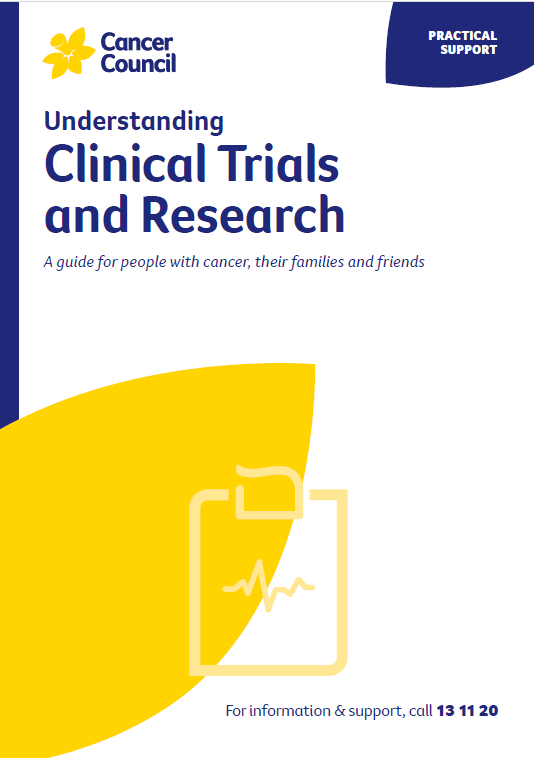- Home
- Skin cancer
- Treatment
- Making treatment decisions
Making treatment decisions
Skin cancers may be treated by GPs, dermatologists, surgeons and radiation oncologists. Ask your doctor to explain the treatment options, and take as much time as you can before making a decision.
Learn more about:
- Knowing your options
- Recording the details
- Asking questions
- Considering a second opinion
- Deciding on treatment
- Finding out any costs
- Getting support
- Joining a clinical trial
- Video: What are clinical trials?
- Podcast: Making treatment decisions
Know your options
Understanding the type of skin cancer you have, available treatments, possible side effects and costs can help you weigh up the options and make a well-informed decision.
Record the details
When your doctor first says you have cancer, you may not remember everything you are told. Taking notes can help. If you would like to record the discussion, ask your doctor first. It is a good idea to have a family member or friend go with you to appointments to join in the discussion, write notes or simply listen.
Ask questions
If you are confused or want to check anything, it is important to ask questions. Try to make a list before appointments. Or you could also talk to a cancer care coordinator or nurse.
Consider a second opinion
You may want to get a second opinion from another doctor to confirm or clarify your doctor’s recommendations or reassure you that you have explored all of your options. Doctors are used to people doing this, and they can refer you and send your initial results to another doctor. You can get a second opinion even if you have started treatment or still want to be treated by your first doctor. You might decide to be treated by the second doctor.
It’s your decision
Adults have the right to accept or refuse any treatment that they are offered.
Find out any costs
If you see your GP or go to a skin cancer clinic, your visit may be bulk-billed or you may have to pay upfront. Medical centres and skin cancer clinics may offer a bulk-billed skin check, but you may need to pay for any treatment you have. Fees often depend on whether you have surgery or a biopsy. You may also need to pay for follow-up appointments to check the wound or have stitches removed.
When you make an appointment, ask what you will have to pay and how much is refunded by Medicare. Most places will ask you to pay on the day you see the doctor. If you have concerns about the cost, ask whether there are any payment plans or other options available to you.
Some public hospitals have outpatient clinics that provide government- funded skin cancer treatment. Your GP can refer you when appropriate. In areas without a clinic, you may be able to see a visiting specialist.
Cancer Council does not operate or recommend any specific skin cancer clinics or individual specialists.
Get support
If you have a partner, you may want to discuss the treatment options with them. Talking to friends and family, or to other people who have had similar experiences, may also be helpful. Call Cancer Council 13 11 20 to find out ways to connect with others for mutual support.
Should I join a clinical trial?
Your doctor or nurse may suggest you take part in a clinical trial. Doctors run clinical trials to test new or modified treatments and ways of diagnosing disease to see if they are better than current methods. For example, if you join a randomised trial for a new treatment, you will be chosen at random to receive either the best existing treatment or the modified new treatment. Over the years, trials have improved treatments and led to better outcomes for people diagnosed with cancer.
You may find it helpful to talk to your specialist, clinical trials nurse or GP, or to get a second opinion. If you decide to take part in a clinical trial, you can withdraw at any time.
For more information, see Clinical trials and research. To find current clinical trials near you, visit Cancer Institute NSW or Australian Cancer Trials.
Learn more about the different types of skin cancer.
→ READ MORE: Surgery for skin cancer
Video: What are clinical trials?
In this video, Medical Oncologist Dr Elizabeth Hovey explains what clinical trials are and how they can improve cancer treatment.
Podcast: Making Treatment Decisions
Listen to more episodes from our podcast for people affected by cancer
A/Prof Victoria Mar, Director, Victorian Melanoma Service, Alfred Hospital and Monash University, VIC; Tracey Bilson, Consumer; Raelene Buchan, Consumer; Alison Button-Sloan, Consumer; Dr Margaret Chua, Radiation Oncologist, and the Skin Radiation Oncology team, Peter MacCallum Cancer Centre, VIC; Prof Anne Cust, Deputy Director, The Daffodil Centre, The University of Sydney and Cancer Council NSW, Chair, National Skin Cancer Committee, Cancer Council, and faculty member, Melanoma Institute Australia; A/Prof Paul Fishburn, Skin Cancer Doctor, Norwest Skin Cancer Centre, NSW and Faculty of Medicine, University of Queensland; Danielle Goss, Melanoma Clinical Nurse Specialist, Amie St Clair Melanoma (part of Melanoma Institute Australia), Wagga Wagga, NSW; Louise Pellerade, 13 11 20 Consultant, Cancer Council WA: Dr Shireen Sidhu, Head of Dermatology, The Royal Adelaide Hospital, SA; Dr Amelia Smit, Research Fellow – Melanoma and Skin Cancer, The Daffodil Centre, The University of Sydney and Cancer Council NSW; Dr Tony Tonks, Plastic and Reconstructive Surgeon, Canberra Plastic Surgery, ACT.
View the Cancer Council NSW editorial policy.
View all publications or call 13 11 20 for free printed copies.
